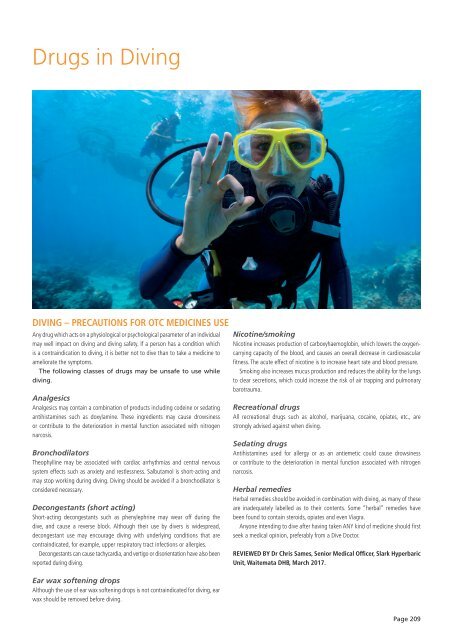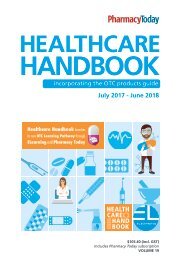2017 HCHB_digital
Create successful ePaper yourself
Turn your PDF publications into a flip-book with our unique Google optimized e-Paper software.
Drugs in Diving<br />
DIVING – PRECAUTIONS FOR OTC MEDICINES USE<br />
Any drug which acts on a physiological or psychological parameter of an individual<br />
may well impact on diving and diving safety. If a person has a condition which<br />
is a contraindication to diving, it is better not to dive than to take a medicine to<br />
ameliorate the symptoms.<br />
The following classes of drugs may be unsafe to use while<br />
diving.<br />
Analgesics<br />
Analgesics may contain a combination of products including codeine or sedating<br />
antihistamines such as doxylamine. These ingredients may cause drowsiness<br />
or contribute to the deterioration in mental function associated with nitrogen<br />
narcosis.<br />
Bronchodilators<br />
Theophylline may be associated with cardiac arrhythmias and central nervous<br />
system effects such as anxiety and restlessness. Salbutamol is short-acting and<br />
may stop working during diving. Diving should be avoided if a bronchodilator is<br />
considered necessary.<br />
Decongestants (short acting)<br />
Short-acting decongestants such as phenylephrine may wear off during the<br />
dive, and cause a reverse block. Although their use by divers is widespread,<br />
decongestant use may encourage diving with underlying conditions that are<br />
contraindicated, for example, upper respiratory tract infections or allergies.<br />
Decongestants can cause tachycardia, and vertigo or disorientation have also been<br />
reported during diving.<br />
Ear wax softening drops<br />
Although the use of ear wax softening drops is not contraindicated for diving, ear<br />
wax should be removed before diving.<br />
Nicotine/smoking<br />
Nicotine increases production of carboxyhaemoglobin, which lowers the oxygencarrying<br />
capacity of the blood, and causes an overall decrease in cardiovascular<br />
fitness. The acute effect of nicotine is to increase heart rate and blood pressure.<br />
Smoking also increases mucus production and reduces the ability for the lungs<br />
to clear secretions, which could increase the risk of air trapping and pulmonary<br />
barotrauma.<br />
Recreational drugs<br />
All recreational drugs such as alcohol, marijuana, cocaine, opiates, etc., are<br />
strongly advised against when diving.<br />
Sedating drugs<br />
Antihistamines used for allergy or as an antiemetic could cause drowsiness<br />
or contribute to the deterioration in mental function associated with nitrogen<br />
narcosis.<br />
Herbal remedies<br />
Herbal remedies should be avoided in combination with diving, as many of these<br />
are inadequately labelled as to their contents. Some “herbal” remedies have<br />
been found to contain steroids, opiates and even Viagra.<br />
Anyone intending to dive after having taken ANY kind of medicine should first<br />
seek a medical opinion, preferably from a Dive Doctor.<br />
REVIEWED BY Dr Chris Sames, Senior Medical Officer, Slark Hyperbaric<br />
Unit, Waitemata DHB, March <strong>2017</strong>.<br />
Page 209



